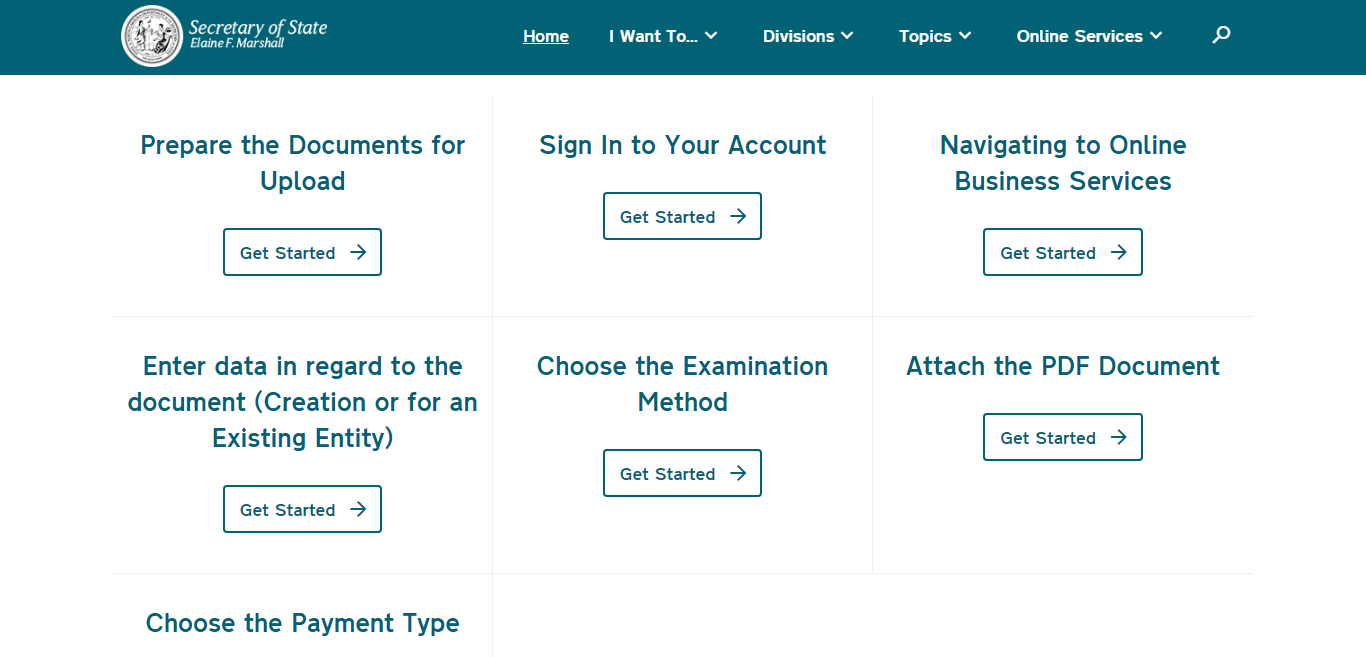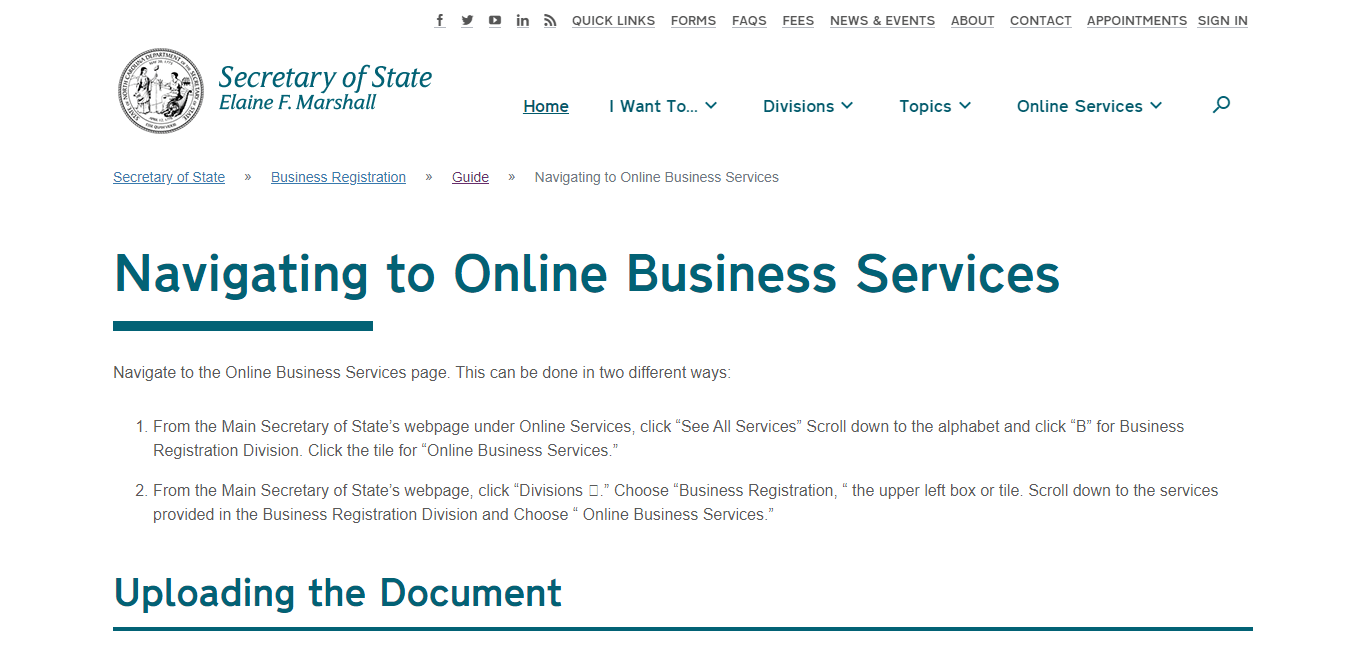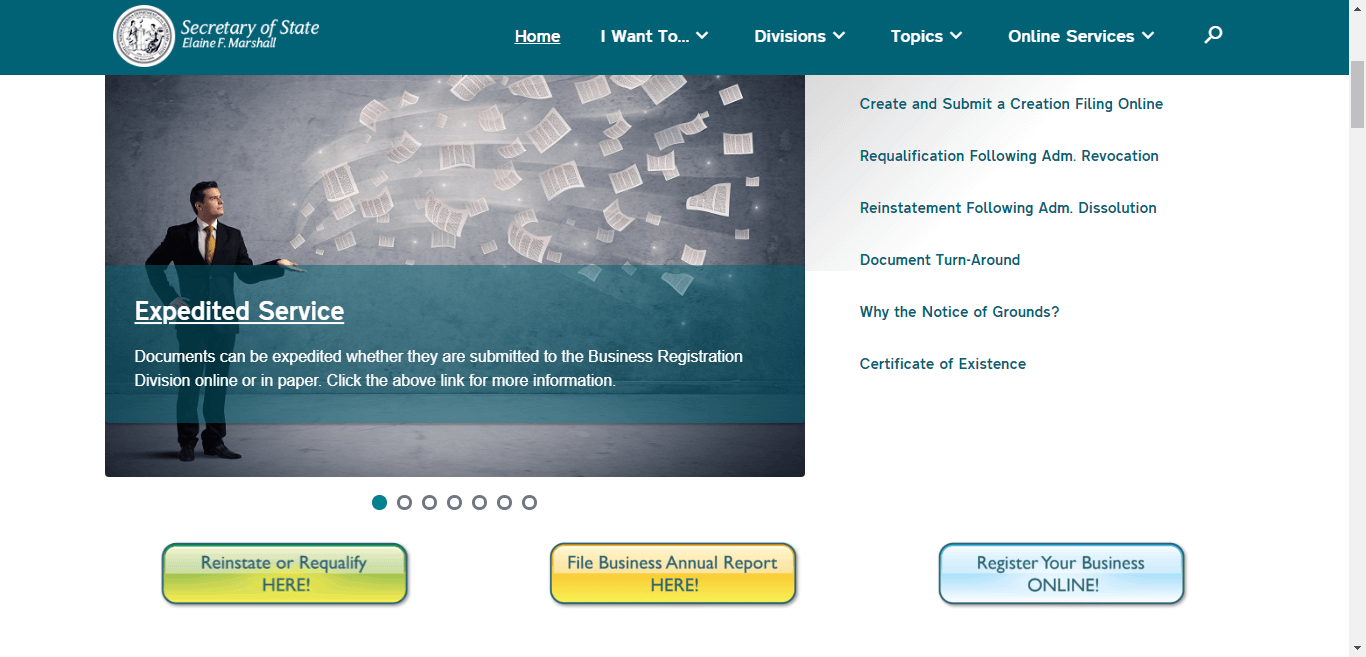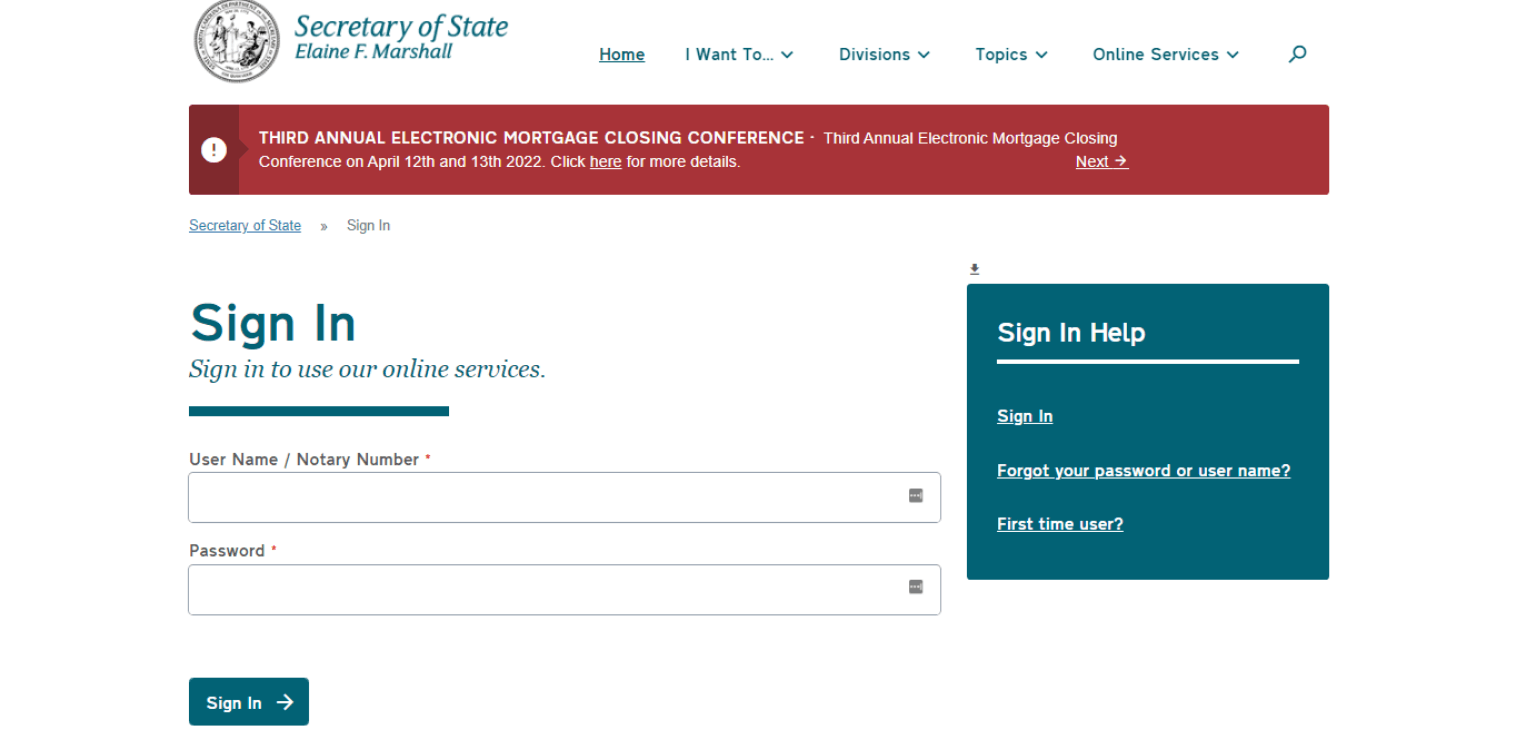
If you already have an LLC in another state and want an LLC in NC, then starting an LLC would be somewhat different. You must register as a foreign LLC. We have here a guide on how you can qualify and register for a foreign LLC in North Carolina.
On this page, you’ll learn about the following:
Forming an North Carolina Foreign LLC
A foreign LLC does not need to be a company from another country but a business formed under the laws of another state. To start a foreign LLC in North Carolina, you need to register it with the North Carolina Secretary of State.
Step 1: Choose North Carolina Foreign LLC Name
Obtain a name reservation certificate and submit it with your foreign qualification requirements at the North Carolina Secretary of State. Your LLC’s legal name outside of North Carolina will be listed on the application, along with the name it will use in North Carolina. Take note of the requirements for naming your LLC.
Check name availability at North Carolina’s business entity names and reserve your LLC name.
Step 2: Select North Carolina Foreign LLC Registered Agent
You’ll need a registered agent to form a foreign LLC in North Carolina and take note that a North Carolina registered agent must have a local address. Here are three of the best LLC services on our list that will provide you with registered agents to ease your worries:
Step 3: File Registration of North Carolina Foreign LLC
Fill out and submit a Foreign LLC Application for Registration form via email to [email protected] or by mail to NC Secretary of State Business Registration, P.O. Box 29622, Raleigh, North Carolina 27626-0622.
Include the following:
- LLC’s full legal name.
- A fictitious name or a DBA (only if your LLC’s legal name is not available); Attach a statement of adoption of the fictitious name signed by all LLC members.
- LLC’s principal office and mailing addresses.
- LLC formation state and date.
- Registered agent’s name and address in North Carolina.
- Date when your LLC will start operations in North Carolina.
- Credit card information on the last page of the form for the $150 application fee.
The LLC cost in North Carolina, even for foreign LLCs will differ between online filing and by mail.
Step 4: Determine How Your North Carolina Foreign LLC is taxed
Foreign LLCs are also subjected to the North Carolina Business Privilege Tax, and they must file LLC annual reports each year.
Note that forming a foreign LLC would be good for your business as you can legally operate in a different state thus reaching a larger market and opening more opportunities for higher profit.
Steps to Filing North Carolina Foreign LLC
Time needed: 5 minutes
To establish your foreign LLC in the State of North Carolina, you are required to register your business LLC with the Secretary of State of North Carolina. You can apply for Certificate of Authority for Limited Liability Company via online as well as offline mode. The cost of registration is $250. Once your application is approved, you will receive a Certified Copy of your registration from the Secretary of State office. We have explained the aspects you need to cover when you apply for the North Carolina Foreign Limited Liability Company.
- Go to the Official North Carolina Secretary of State website
Visit the NC SOS portal on the official Secretary of State website. The portal is a one-stop solution to different business filings online. You can easily submit your business documents by creating a free account on the portal. Scroll down and select the option of ‘Online Business Services’.
- Navigate to Online Business Services
On the given page, select the option of ‘Navigate to Online Business Services’ present on the top section of the screen. Next, select the link of ‘Business Registration’ from the given drop-down list.
- Register your business
On the Business Registration page, scroll down and select the third tab ‘Register your Business Online’. On the next page, the Sign In box appears. If you already have an account on the NC SOS portal, proceed to log in by entering your username or notary number and password. If you do not have an account, go on to read the next step to create an account on the portal.
- Create your account:
To create your account, on the Sign In page, under the Sign In help box click on the ‘First Time user?’ link.
- Complete the Registration Process
On the Create a New Account page, create your username and password and proceed to fill in the other required details such as Business name, first and last name, street address, and contact details. Click on the ‘Register’ tab.
- File your application
After creating your account on the portal, log in to your account using the username and password. On the user homepage, select the option to ‘Create a Business Online’ under the ‘I want to..’ section from the toolbar. Now on the online application page, proceed to fill in all the required fields with your relevant business information. Upload all the mandatory documents in the given sections.
- Review your application
Before submitting your application, recheck all the information entered by you to be correct and accurate to your knowledge.
- Make the payment
As the last step, proceed to the payment gateway page and make an online payment of $250.00 as the filing fee for your North Carolina Certificate of Authority Application. After you have successfully submitted your application form, you will receive a notification from the Secretary of State office acknowledging the receipt of your application.
Filing your North Carolina Certificate of Authority by Mail
You can also file your Foreign LLC Certificate of Authority Application by mail
- Download the Application form PDF (Form L-09) on your system.
- Read all the instructions carefully and proceed to fill in the application form.
- You must attach the original Certificate of Existence issued by the State of Original jurisdiction, which should be less than 6 months old from the date of issuance.
- Review all the information entered by you to be correct and accurate.
- Issue a money order or check of $250 as the filing fee for your Foreign LLC Registration application, payable to the ‘Secretary of State’.
- Arrange all the documents and mail it to the following address, Business Registration Division P.O. Box 29622 Raleigh, Nc 27626-0622.
After Forming North Carolina Foreign LLC
Here are added things you need to accomplish after forming your North Carolina Foreign LLC
- Obtain Business Licenses. Find the business licenses you’ll need using the Business License Search.
- File LLC annual reports and Business Privilege Tax.
- Pay State Taxes like sales tax; you’ll need an EIN for your LLC.
It is convenient plus easy to file for the foreign LLC if you are doing it online. The steps are very easy and that’s why it’s possible to go along with the steps and form the foreign LLC in North Carolina.
F.A.Qs
If your LLC is formed under the laws of another state, it is referred to as a foreign LLC in North Carolina.
Businesses incorporated outside of the state where they operate must have “foreign qualifications” issued in the other states.
A domestic LLC is a company registered in North Carolina as an LLC. The entity type that has a physical presence in another state is a foreign LLC.
How Much Does It Cost to Register a Foreign LLC in North Carolina
To register as a foreign LLC in North Carolina, you can file through mail or online by paying a filing fee of $250 to the North Carolina Secretary of State.
It is crucial to recognize that each state has its own regulations and requirements when it comes to registering a foreign LLC, and North Carolina is no exception. While particular costs associated with the process may vary depending on the specifics of the business and the selected professional assistance, there are some general guidelines that can help in determining the potential expenses.
First and foremost, one of the primary costs associated with registering a foreign LLC in North Carolina is the filing fee. This fee is typically paid to the North Carolina Secretary of State along with the required documents to officially register the foreign LLC. The filing fee amount can vary, so it is essential to verify the current fees directly with the Secretary of State’s office.
Additionally, hiring a registered agent in North Carolina is another expense that should be taken into consideration. A registered agent is an individual or entity authorized to receive legal and official documents on behalf of the foreign LLC. This serves as a legal requirement to ensure that the foreign LLC is easily reached for any legal or official matters. The cost of hiring a registered agent may vary depending on the selected agency or individual.
Moreover, some foreign LLCs may choose to seek professional assistance from attorneys or business consultants to ensure a smooth and successful registration process. While this certainly incurs an additional cost, the guidance and expertise provided by professionals can help navigate the complexities of the registration process and ensure compliance with all North Carolina regulations.
Other fees that may be associated with registering a foreign LLC in North Carolina include obtaining a Certificate of Authority, which grants the foreign LLC permission to operate within the state. The cost of this certificate can vary, so it is essential to confirm the current charges with the respective authorities.
It is also important to consider ongoing costs associated with maintaining a foreign LLC in North Carolina, such as annual report fees and state taxes. While these fees are not directly related to the initial registration process, they are essential for keeping the foreign LLC in good standing with the state and compliant with all regulations.
In conclusion, understanding the costs associated with registering a foreign LLC in North Carolina is crucial for any entrepreneur looking to expand their business into the state. By considering the filing fees, hiring a registered agent, seeking professional assistance, obtaining necessary certificates, and maintaining compliance with ongoing costs, businesses can effectively budget and plan for the registration process. As with any business decision, it is essential to conduct thorough research and seek proper guidance to ensure a smooth and successful registration process in North Carolina.
In Conclusion
Starting a foreign LLC in North Carolina does not require a lot of documentation or tasks. However, it is always good to seek help from a professional when it comes to running your business. Get a professional registered agent and form your foreign LLC anywhere without a hassle.





